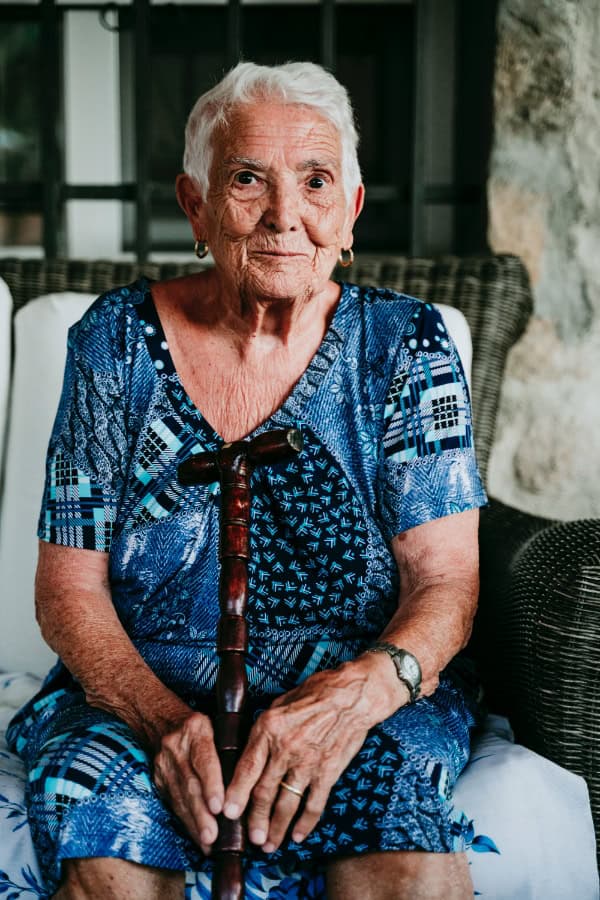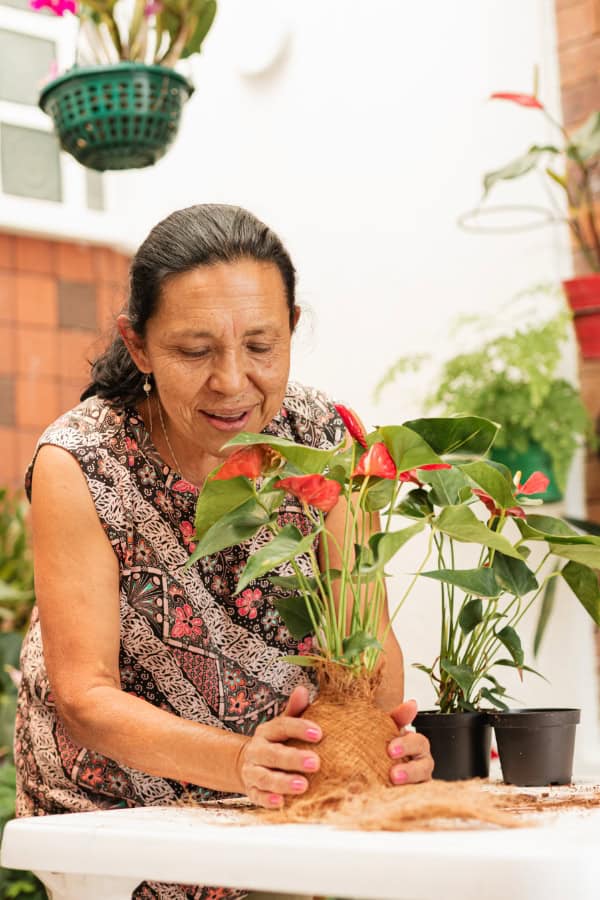Hospice FAQs
Care Services
Hospice care operates on a patient-centered approach that prioritizes comfort, dignity, and quality of life.















How Does Hospice Care Work?
Hospice care operates on a patient-centered approach that prioritizes comfort, dignity, and quality of life. The process begins with an initial assessment where the hospice team meets with the patient and their family to evaluate their needs and develop a personalized care plan tailored to their specific situation.
Once the care plan is established, the patient receives ongoing support through regular visits from a team of nurses, aides, and other healthcare professionals who manage symptoms and provide emotional support. Hospice care also emphasizes holistic care, addressing the physical, emotional, and spiritual well-being of both the patient and their family, ensuring comprehensive support throughout the entire journey.
What Role Do Volunteers Play in Hospice Care?
Volunteers are a vital component of hospice care, offering compassionate support to both patients and their families. They provide companionship by engaging in activities such as reading, talking, or simply being present, which can significantly alleviate feelings of loneliness and anxiety. Additionally, volunteers assist with light household tasks or running errands, helping to ease the daily burdens on the patient and their caregivers.
By offering respite to caregivers, volunteers give them much-needed breaks to rest and recharge. Furthermore, volunteers may help with administrative tasks at hospice facilities, ensuring that operations run smoothly and allowing the professional staff to focus more on patient care.
Who Qualifies for Hospice Care?
Hospice care is available to individuals who have been diagnosed with a terminal illness and have a life expectancy of six months or less if the illness follows its natural course. Common qualifying conditions include advanced stages of cancer, heart disease, lung disease, kidney failure, and neurological conditions such as Alzheimer’s disease or amyotrophic lateral sclerosis (ALS). Additionally, individuals suffering from end-stage HIV/AIDS or other chronic illnesses may also qualify for hospice care.
The qualification is determined by a physician who assesses the patient’s medical condition and prognosis to ensure they meet the necessary criteria for receiving hospice services.
How Is Hospice Care Paid For?
Hospice care is generally covered by most insurance plans, which helps ensure that patients can receive the necessary care without facing significant financial burdens. The Medicare Hospice Benefit is one of the primary sources of funding, covering nearly all hospice services, including medications, medical equipment, and supportive care. Medicaid also provides hospice coverage in most states, offering additional support for those who qualify. Additionally, private insurance plans typically include hospice benefits, allowing patients with different types of coverage to access hospice services.
It is important for patients and their families to verify their specific insurance coverage to understand the extent of benefits available to them.
Where Does Hospice Care Take Place?
Hospice care is highly flexible and can be provided in various settings based on the patient’s preferences and needs. The most common location for hospice care is the patient’s home or the residence of a loved one, allowing them to remain in a familiar and comfortable environment surrounded by family and friends. Hospice care can also be delivered in nursing homes or assisted living facilities, providing support to residents who require specialized care. Additionally, dedicated inpatient hospice centers offer a specialized environment for patients who need intensive medical and emotional support that cannot be provided at home. This flexibility ensures that hospice care can be tailored to fit the unique circumstances of each patient.
Who Makes Up the Hospice Team?
The hospice team is composed of a diverse group of professionals and volunteers who work collaboratively to meet the comprehensive needs of the patient. This team typically includes physicians and nurses who provide medical care and manage symptoms, ensuring the patient remains as comfortable as possible. Social workers are also integral, offering emotional and logistical support to both patients and their families, helping them navigate the challenges associated with end-of-life care. Chaplains or spiritual counselors provide spiritual guidance tailored to the patient’s beliefs and needs, fostering a sense of peace and understanding. Home health aides assist with personal care tasks such as bathing, dressing, and mobility, while volunteers offer companionship and practical assistance, enhancing the overall support system for the patient.
What Services Are Provided?
Hospice care encompasses a wide range of services designed to address the physical, emotional, and spiritual needs of patients. Pain and symptom management are central, ensuring that patients remain comfortable by effectively controlling pain, nausea, fatigue, and other distressing symptoms. Emotional counseling and support are provided to help patients and their families cope with the emotional aspects of end-of-life care, offering a compassionate presence and therapeutic conversations. Assistance with daily activities, such as bathing, dressing, and grooming, helps maintain the patient’s dignity and independence. Additionally, hospice care includes bereavement support for families after the patient’s passing, providing resources and counseling to help them navigate their grief and begin the healing process.
Do I Have to Stop Other Medications If I’m in Hospice?
When entering hospice care, patients may continue taking medications that align with the goals of comfort and symptom management. However, medications that are solely focused on curing the illness are typically discontinued, as the focus shifts from curative treatments to palliative care aimed at enhancing quality of life.
Hospice care prioritizes treatments that alleviate pain and discomfort, improve the patient’s overall well-being, and address specific symptoms such as nausea or anxiety. This approach ensures that the medications administered are directly contributing to the patient’s comfort and quality of life during their final stages.
Should I Include Hospice Care in My Advanced Care Planning?
Including hospice care in your advanced care planning is highly recommended as it ensures that your wishes are respected and provides clarity for your loved ones during difficult times. Advanced care planning allows you to make informed decisions about your future medical care, aligning your care choices with your personal values and goals.
By incorporating hospice care into your plan, you provide clear instructions for your healthcare team and family members, ensuring that your preferences for comfort-focused care are understood and followed. This proactive approach helps reduce uncertainty and stress for both you and your family, facilitating a smoother transition when the time comes to receive hospice services.
What Are the Benefits of Using Hospice Care?
Hospice care offers numerous benefits that enhance the quality of life for both patients and their families by focusing on comfort and comprehensive support. One of the key benefits is relief from pain and other distressing symptoms, ensuring that patients remain as comfortable as possible during their final days. Hospice care also provides emotional and spiritual support, helping patients and their families cope with the emotional challenges of end-of-life care.
Family-centered care is another significant advantage, offering education and respite for caregivers, allowing them to rest and recharge while ensuring that their loved ones receive continuous support. Additionally, hospice care promotes a peaceful and dignified end-of-life experience, allowing patients to spend their remaining time in a supportive and loving environment.
Is the Decision for Hospice Care Giving Up Hope or Waiting to Die?
Choosing hospice care is not about giving up hope; rather, it is about shifting the focus to comfort, dignity, and quality of life. Hospice care allows patients to spend their remaining time in meaningful ways with loved ones, prioritizing emotional and physical well-being over aggressive treatments aimed at curing the illness. This decision empowers patients to live their final days with peace and comfort, surrounded by those they care about, and supported by a compassionate care team.
Hospice care provides an opportunity to cherish precious moments and ensures that patients can focus on what truly matters to them during this significant time.
Does Hospice Provide Support to the Family After the Patient Dies?
Yes, hospice care extends its support to families not only before and during the patient’s life but also after their passing. Bereavement services are a crucial part of hospice care, offering grief counseling and support groups to help families process their loss and cope with their emotions. Hospice provides resources to assist families in navigating the challenges associated with loss, ensuring they do not feel alone during their grieving process. Additionally, follow-up care is available for up to 13 months after the patient’s passing, offering continued support and guidance to help families begin the healing journey. This comprehensive support system helps families find solace and strength in the aftermath of their loss.
How Do I Know When It Is Time for End-of-Life Care?
End-of-life care becomes appropriate when a terminal illness progresses to a stage where curative treatments are no longer effective or desired. Recognizing the right time for hospice care involves observing signs such as a decline in health despite ongoing treatment, frequent hospitalizations or emergency room visits, and significant pain or unmanaged symptoms that severely impact the patient’s quality of life. When these indicators are present, it may be time to consider transitioning to hospice care, which focuses on providing comprehensive support centered on comfort and dignity.
Consulting with healthcare professionals can help determine the most appropriate time to initiate end-of-life care, ensuring that the patient receives the necessary support tailored to their evolving needs.
When Should Hospice Be Called?
Hospice care is most beneficial when introduced early in the course of a terminal illness, providing patients and families with the full range of support and services available. It is advisable to call hospice when a terminal illness has been diagnosed and the prognosis is six months or less, as determined by a physician. Additionally, hospice care should be considered when the focus shifts from curative treatments to comfort and quality of life.
Early involvement of hospice ensures that patients receive timely symptom management, emotional support, and comprehensive care planning, enhancing the overall end-of-life experience for both the patient and their family.
Are All Hospices the Same?
While hospice care services are standardized to ensure a baseline level of care, the quality of care, staff expertise, and available resources can vary significantly between different hospice providers. Factors such as the experience and training of the hospice team, the range of services offered, and the level of personalized care provided can influence the overall hospice experience.
It is important for families to research and choose a hospice provider that aligns with their specific needs and preferences. Evaluating factors like reputation, patient reviews, and the availability of specialized services can help ensure that the chosen hospice offers the highest quality of care tailored to the patient’s unique circumstances.
Can My Pain and Symptoms Be Controlled at Home?
Yes, hospice care is designed to provide expert pain and symptom management in the comfort of your own home. The hospice care team, which includes nurses and other healthcare professionals, works diligently to ensure that medications and therapies are available and effectively administered to keep you comfortable.
By managing pain, nausea, shortness of breath, and other distressing symptoms, hospice care allows patients to maintain their quality of life while staying in a familiar and supportive environment. The personalized care plans developed by the hospice team are tailored to address each patient’s specific needs, ensuring that symptoms are controlled and comfort is prioritized.
Does Hospice Provide 24-Hour In-Home Care?
While routine hospice visits are standard, hospice care also provides 24-hour support during times of crisis or when symptoms escalate. This means that if a patient experiences a sudden increase in pain, respiratory distress, or other urgent health issues, the hospice team is available around the clock to provide immediate assistance and manage the situation effectively.
The availability of 24-hour care ensures that patients receive continuous support when needed most, enhancing their comfort and safety while allowing families to have peace of mind knowing that help is always accessible in critical moments.
Can I Live Alone and Still Receive Hospice Services?
Yes, hospice care can be provided to patients who live alone, provided they have a caregiver or a support system to assist with day-to-day needs. Hospice services are designed to offer comprehensive support tailored to the individual’s circumstances, ensuring that patients receive the necessary care even if they are living independently.
The hospice team works closely with family members, friends, or designated caregivers to coordinate care plans, manage symptoms, and provide emotional support. Additionally, volunteers may offer companionship and practical assistance, helping to bridge any gaps in support and ensuring that patients living alone receive the comprehensive care they need.
Can a Hospice Patient Choose to Return to Curative Treatment?
Yes, hospice care is not a permanent commitment, and patients have the flexibility to make changes to their care plan based on their evolving needs and preferences. If a patient decides they want to pursue curative treatments again, they can choose to stop hospice care and resume aggressive medical treatments at any time. This decision allows patients to retain control over their healthcare choices, ensuring that their care aligns with their current goals and desires.
The hospice team supports patients in making informed decisions, providing the necessary information and assistance to facilitate a smooth transition back to curative treatments if desired.
Can I Go Back to the Hospital and Still Receive Hospice Care?
Yes, hospice care accommodates hospital visits when necessary, such as for symptom management or emergencies. If a hospice patient needs to go to the hospital for any reason, the hospice team coordinates with hospital staff to ensure that care remains seamless and consistent. This collaboration ensures that the patient continues to receive the support and services they need, even when receiving care outside of the home setting.
The hospice team remains actively involved in the patient’s care plan, maintaining communication with hospital professionals to uphold the patient’s comfort and quality of life during hospital stays.
Do I Have to Be Homebound to Receive Hospice Services?
No, being homebound is not a requirement to receive hospice care. Hospice services are flexible and can be provided wherever the patient resides, whether at home, in a nursing facility, or an inpatient hospice center. The primary criteria for hospice eligibility are having a terminal illness with a prognosis of six months or less and choosing to focus on comfort rather than curative treatments. Regardless of the patient’s living situation, hospice care can be tailored to meet their needs, ensuring that they receive the appropriate support and services in the environment that best suits their preferences and circumstances.